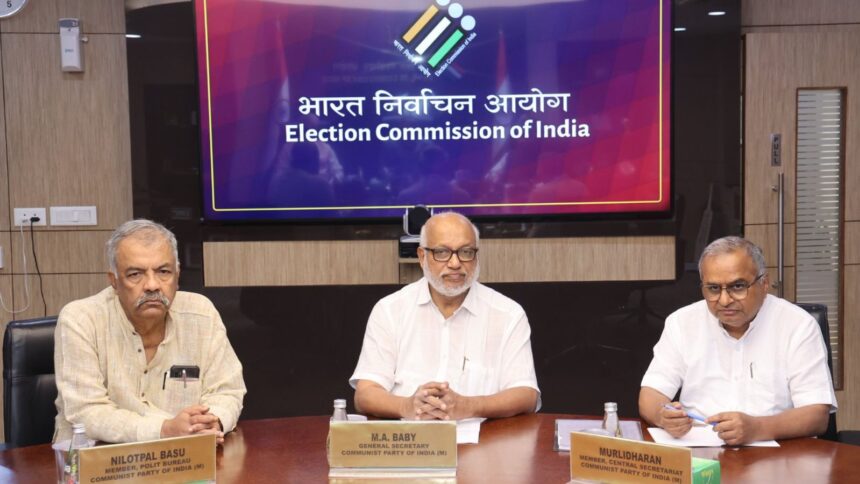In the third such interaction with a political delegation this week, the three-member Election Commission of India (ECI) on Saturday met the CPI(M), which opposed simultaneous polls under the ‘One Nation, One Election’ (ONOE) concept, saying that the party strongly felt that it was aimed towards the creation of “a centralised unitarian State”.
The consultation, where the party also questioned the Commission’s alleged “inability of restraining or punishing” political parties and leaders who were “making appeals based on religion and caste” in addition to allegedly employing “misuse of places of worship for campaign and propaganda”, is part of the poll management body’s initiative for national and state party presidents to share their suggestions and concerns directly with the Commission.
According to the CPI(M), the delegation consisted of General Secretary M A Baby, Polit Bureau member Nilotpal Basu and Central Secretariat Member Muralidharan.
CEC Shri Gyanesh Kumar and ECs Dr. Sukhbir Singh Sandhu & Dr. Vivek Joshi interacted with a delegation of the CPI(M) led by its General Secy. M. A. Baby at Nirvachan Sadan today as part of ECI’s engagement with the Presidents of various National and State Political Parties.
— Election Commission of India (@ECISVEEP)
supremo and former Uttar Pradesh chief minister Mayawati had met the ECI on Tuesday, followed by a delegation led by national president Jagat Prakash Nadda on Thursday.
In its note submitted to the Commission, the CPI(M), welcoming this engagement and consultations with political parties and similar meetings as a regular feature in future, expressed strong opposition to simultaneous elections in India.
“The CPI(M) is opposed to the ‘One Nation, One Election’ (ONOE) concept, which we strongly feel is aimed towards the creation of a centralised unitarian State…ONOE…amounts to truncating the life of some legislative assemblies to align them with the Lok Sabha election,” it stated, adding that the model undermined basic features of the Constitution – democracy and federalism.
The CPI(M) delegates’ submission on election promises was in opposition to the enactment of any law declaring manifesto promises by a political party resulting in direct or indirect financial aid to be a corrupt practice, on grounds that this curtailed the right of political parties to freely express their policies, programmes and promises to the people.
“On the surface, though it may seem to underscore the importance of transparency and accountability in the electoral process, it in fact strikes against the right of political parties to freely express their policies, programmes and promises to the people,” it said.
“Any infringement on the right of expression by intervention by any authority, body or agency will cut at the root of the political party system and free and fair elections,” it added, saying that there were already requisite guidelines in the ‘General Conduct’ part of the ‘Model Code of Conduct for the Guidance of Political Parties and Candidates’.
The CPI (M) flagged to the ECI what it termed a “faltering” approach when it came to “restraining or punishing” parties and leaders who were either allegedly making appeals based on religion and caste or misusing places of worship for campaign and propaganda.
“What starkly stood out was the initial refusal of the Commission to even take cognisance of the multiple complaints lodged against Prime Minister (Narendra) Modi for his blatantly communal campaign despite its own advisory about plummeting levels of public discourse,” it said.
“There have been several instances of the misuse of office by the Prime Minister, the home minister and others during the course of elections…Surely, one will witness the spectacle of the exploitation of ‘Operation Sindoor’ for electoral gains by the ruling party,” it alleged.
Flagging what it termed “a huge disparity” in the ratio of vote share and seat share, the party underlined instances where parties enjoying significant vote share fail to get a proportionate share of seats and parties with lesser vote share get more seats.
“In 2014, for the first time, a party, the BJP, with a vote share of just 31 per cent, won more than half the number of seats in the Lok Sabha elections. As opposed to it, the Congress with 19.3 per cent votes got just 44 seats,” it said.
“In the 2024 LS elections, the BJP secured 240 seats with 36.56 per cent votes, while the Congress, with a mere increase of 1.89 per cent, won an additional 55 seats as compared to 2014,” it added.
Referring to similar examples in states during the Lok Sabha elections, the statement cited Uttar Pradesh, Odisha, Andhra Pradesh, and as examples of less vote share translating into more seats.
It also cited the 2024 Assembly elections in Andhra Pradesh and Odisha, adding, “We are sure these instances would suffice to underline this point…It is in an effort to set right these anomalies and the distortion of people’s mandate to some extent that we have been advocating for proportional representation with a partial list system.”
Flagging the issue of money power in relation to the outcome of elections, the CPI(M) submitted that it was a matter of grave concern that “increasingly people with more money at their disposal are taking their seats in elected bodies that determine policies and the future of the people”.
“Money power is disturbing the level-playing field and vitiating the whole process of free and fair elections, which is the essential feature of a democratic polity. It is evident that financial superiority translates into electoral advantage, and so parties and candidates who have better financial resources have a greater chance of winning elections,” it stated.
Seeking a solution for “increasing doubts” about the “vulnerability” of EVMs, the CPI(M) reiterated that it favoured a modification in the placement of voter verifiable paper audit trail (VVPATs) machines to aid the perception of the integrity of the whole process.
“As per the current sequence in which the machines are placed: first is the ballot unit, followed by the VVAPT, and last in the sequence is the Control Unit…there are doubts over whether it is their choice that is actually recorded in the Control Unit,” it stated.
“We and many others also have been suggesting that the VVAPT should be placed at the end after the control unit. This would clear doubts that exist about the integrity of the process,” it added.
Seeking a solution to discrepancies between the initial data of voter turnout released at the end of polling and the final data released after “delay of a number of days”, the CPI(M) said it would be in the fitness of things if rules can be amended to facilitate the uploading of Part 1 of Form 17C on the ECI website, immediately after the conclusion of polling in a constituency.
Underlining the need for reforms in the ECI, the delegation submitted that the party believes that the independence and autonomy of the Election Commission is a key to strengthen its role as an independent constitutional body.
“It is in keeping with this understanding that the party welcomed the Supreme Court verdict of 2023…that the chief election commissioner and the election commissioners should be appointed by a committee consisting of the Prime Minister, the Leader of Opposition in the Lok Sabha and the Chief Justice of India” which however was “undermined by the government” by passing a legislation by which the Chief Justice of India was replaced by “a Union Cabinet Minister to be nominated by the Prime Minister”.
“This ensures that the majority opinion of the executive will always prevail. This, we strongly believe, destroys the impartiality and the independence of the Election Commission. The independence and autonomy of the ECI will have to be tempered with the need for its accountability,” it said, seeking a rectification in this regard.








